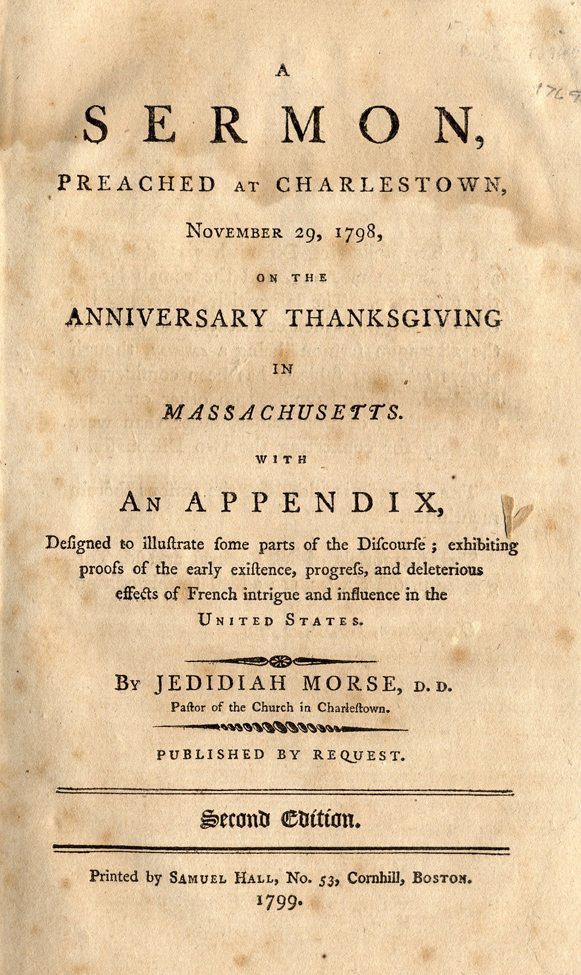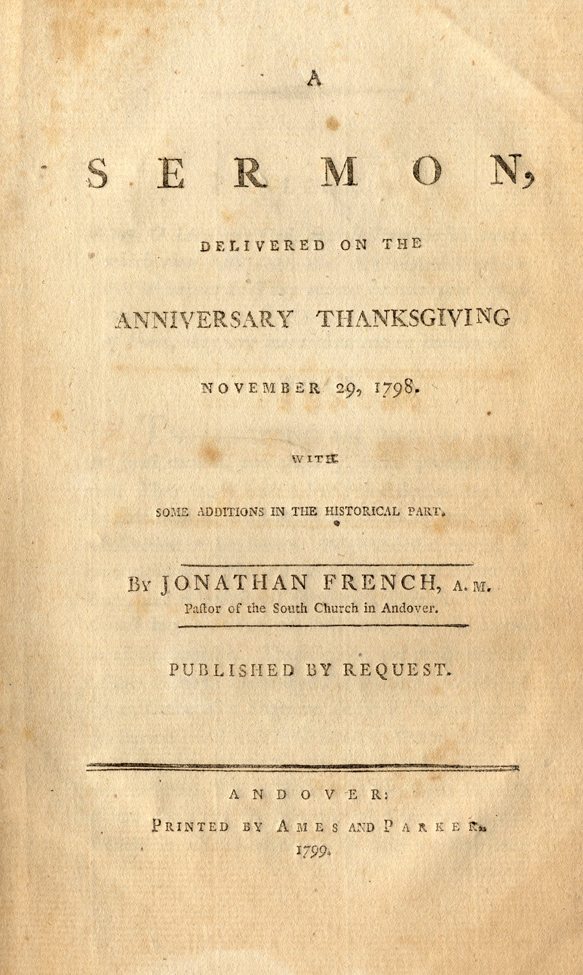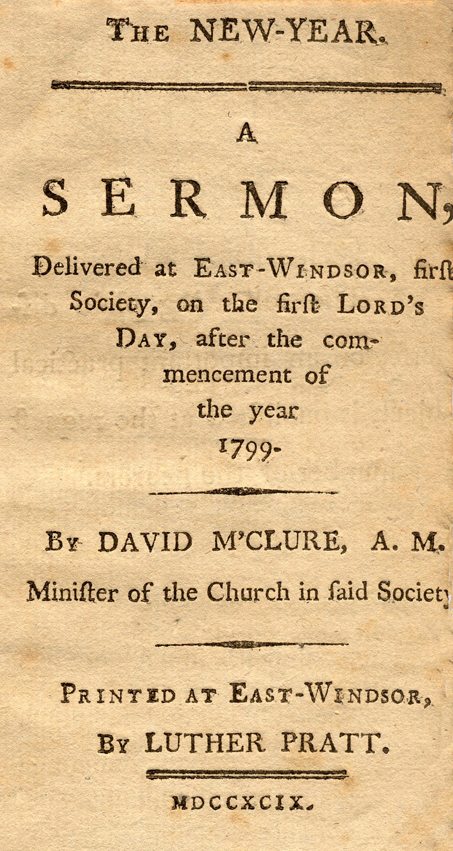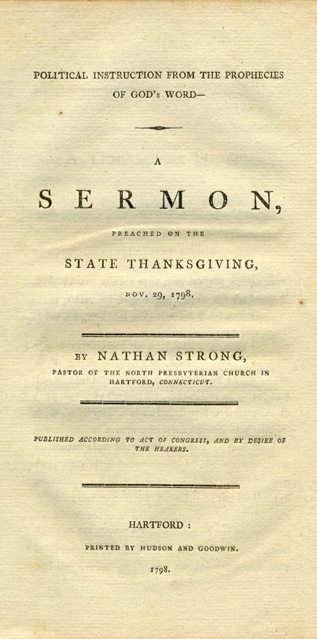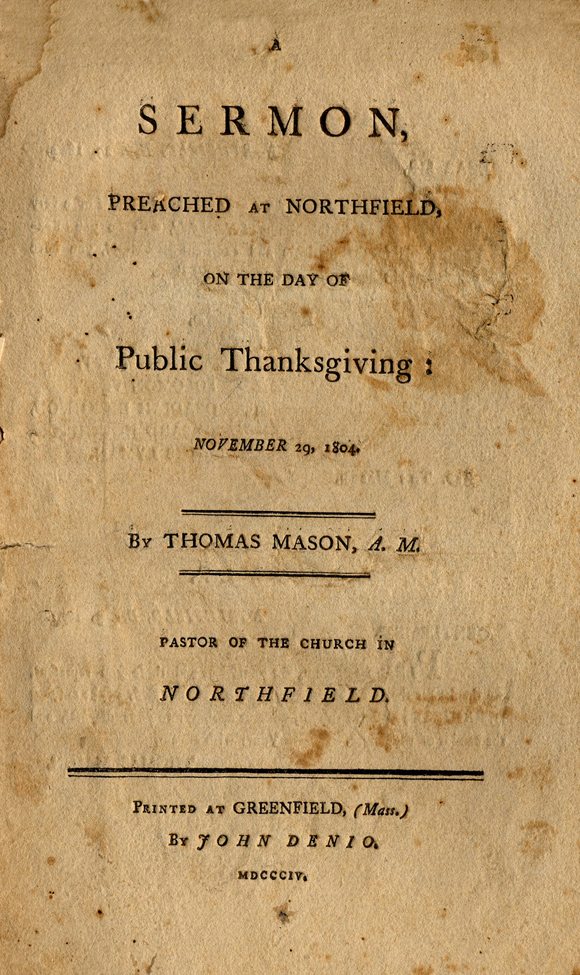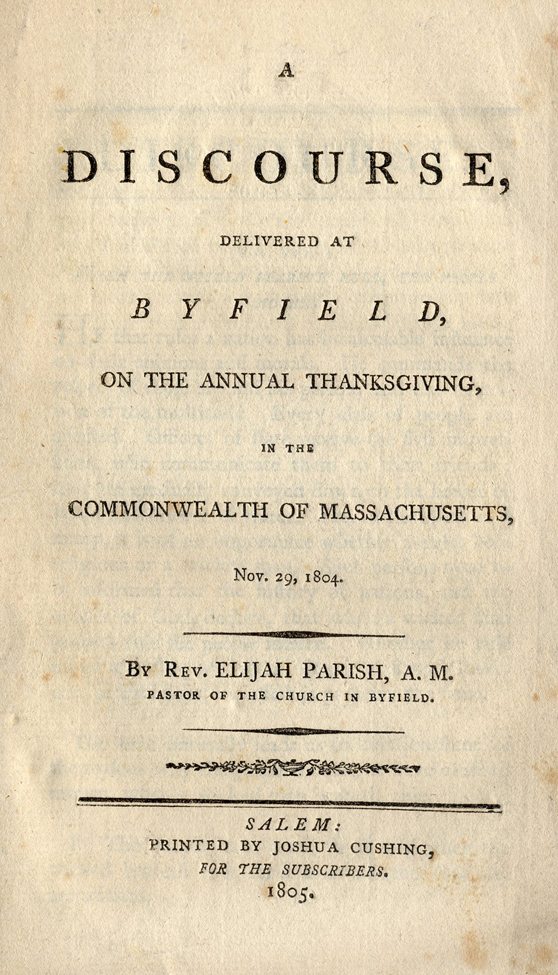Levi Frisbie (1748-1806) graduated from Dartmouth in 1771. After graduating, he served as a missionary to various Indian tribes – including the Delaware Indians and Canadian tribes. Frisbie was the pastor of the 1st Congregational Church at Ipswich, MA beginning in 1776. This Thanksgiving sermon was preached in Massachusetts on February 19, 1795.
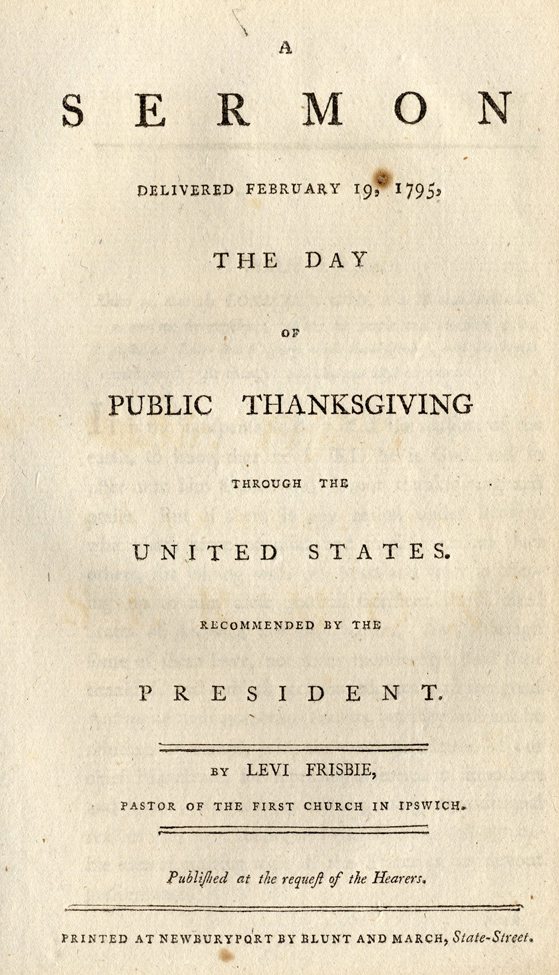
Sermon
Delivered February 19, 1795,
THE DAY
OF
Public Thanksgiving
Through The
United States
Recommended By The
President.
By Levi Frisbie,
Pastor of the First Church in Ipswich.
PSALM c. 3,4.
Know ye, that the LORD He is GOD, it is He that hath made us and not we ourselves; we are his people and the sheep of his pasture. Enter into his hates with thanksgiving, and his courts with praise: Be thankful unto him and bless his name.
It is the indispensable duty of all the nations of the earth, to know that the LORD he is God, and to offer unto him sincere and devout thanksgiving and praise. But if there is any nation under heaven, which hath more peculiar and forcible reasons than others, for joining with one heart and voice in offering up to him these grateful sacrifices, the United States of America are that nation. And although some of them have, not many months ago, paid their thankful, and public acknowledgements to the great Author of their numerous favors, yet they will not be reluctant to comply with the recommendation of our chief Magistrate, for repeating a service so important and joyful; especially considering the great additional reasons they have for it, and the affecting and agreeable idea of uniting with all the States in its devout performance.
And among the various passages of scripture which presented to view, none appeared more suitable than that which has just been read, to excite and direct our sentiments and expressions of gratitude and praise upon this great occasion. In the beginning of this divine song, the Psalmist calls upon the inhabitants of every land to celebrate the praises of God in joyful strains. He then appears to address himself more immediately to the people of Israel, and exhorts them to know that the LORD he is God. That is, let your minds be impressed with a lively remembrance, a deep conviction, that JEHOVAH, the God of Israel, is the only true and living God. And he is our Creator, for it is he that hath made us and not we ourselves. He hath not only called us into existence, as individuals, by his providential energy, but by the wonderful and gracious operations of his mighty hand, he hath made us a nation, and taken us into a near and happy relation to himself. For we are his people and the sheep of his pasture. These figurative expressions allude to the conduct of the God of Israel, in making that people the object of his peculiar care and kindness, the redeeming them from cruel bondage, leading them into the land of promise, introducing them into his rich and plentiful pastures of invaluable privileges and enjoyments; that is, making ample provision for their civil and religious instruction, security, virtue and happiness. For all which they were bound to enter his gates with thanksgiving, and his courts with praise.
Now, although the conduct of God towards us as a nation has not been marked with wonders and miracles has not been marked with wonders and miracles, as it was towards the people of Israel, yet has it not been such as to warrant us to adopt, with a good degree of propriety, the language of the Psalmist and say, “The LORD he is God, ‘tis he who hath made us and not we ourselves; we are his people and the sheep of his pasture:” Let us therefore “enter his gates with thanksgiving, and his courts with praise. Let us be thankful unto him and bless his name.
Taking the text in this appropriate sense, it leads us to consider
I. The reasons and motives we have for offering to God thanksgiving and praise:
II. The nature and manner of this duty; or in what it consists, and how it is to be performed.
In the first place, we are seriously to consider the reasons and motives we have for offering to God thanksgiving and praise.
The first reason is, that he is indeed the only living and true God. Know that the LORD he is God. And do we not all profess to know and believe that JEHOVAH the God of Israel is the true God; the Author of al being and the Dispenser of all benefits? And that, consequently, it is our indispensible duty to honor him with a tribute of adoration and praise?
Secondly, As he is the true God, so he stands related to us as our most wise, powerful and benevolent Creator. For it is He who hath made us and not we ourselves. God is said to create things in several different sense—First, when he produces something where nothing before existed. Secondly, when by his immediate wisdom and power he forms or raises creatures out of pre-existent matter. Thus he formed Adam out of the dust of the earth, and caused the earth and waters to bring forth those various tribes of living creatures which inhabit them. Thirdly, when by the operation of the laws and principles of nature, he causes some beings to produce others of the same constitution and likeness with themselves. Thus when one generation of plants and animals perishes, “He sends forth his spirit” as the Psalmist declares “and they are again created, and he renews the face of the earth.” In this manner, we, and all other living creatures are now created. We are as really brought into existence by a divine power, as Adam was, though this power operates according to the laws, and through the medium of natural and secondary causes—If then, our being, in connection with the powers of life, action and enjoyment which belong to it, together with all the means of pleasure, safety and happiness with which we are furnished, is a great and fundamental blessing derived from God, surely we are bound to praise him for it, and to acknowledge the bestowment of it, as an expression of his infinite power, wisdom, and goodness.
Fourthly, God is said to make or create a people, when by the agency and direction of his providence they are formed into a nation, united by the bonds of civil society, and placed under the influence of civil government—In this sense, he is represented as having made or created the nation of thee?”* So the prophet Isaiah speaking to the same people declares, Thus saith the Lord who created thee, O Jacob, and he that formed thee O Israel.† Now, although it be true, that the operations of divine providence in forming the Jewish nation, were miraculous, and extraordinary , and are not so in forming any other nation, yet ‘tis equally true that his providence has, in a more ordinary manner, a directing, superintending influence in the formation of all other nations. This will be readily acknowledged by all who believe the doctrine of a general and particular providence; or that God orders, permits, directs and controls, the great affairs of the world, of nations and societies, and even the concerns of every individual of mankind. He hath formed them with rational and social natures, and inspired them with principles and instincts which excite them to seek their own safety and happiness; and hence they are drawn by inclination and impelled by necessity to form themselves into societies. But these societies cannot subsist, and attain the end of their formation without civil government, and such laws and regulations as are suited to promote and secure their order, safety and happiness. Therefore as the principles and circumstances which dispose and constrain a people to assume a national capacity, and form a civil government, originate from god, and operate under the superintendence of his Providence, their national state and character are the effect of his appointment and agency, and he may be said to be their former and Creator—And if their government and civil institutions are wise and righteous, and if the officers and magistrates who are to administer this government, to form and execute its laws and regulations, are wise, just and faithful in the discharge of their duty, then they are dignified and warranted by the sanction of the divine authority and approbation— And hence it is that St. Paul in his Epistle to the Romans assures us: “There is no power but of God: the powers that be are ordained of God. Whosoever therefore resisteth the power shall receive to themselves damnation. For rulers are not a terror to good works, but to the evil. Wilt thou not then be afraid of the power? Do that which is good and thou shalt have praise of the same: For he is a minster of God to thee for good; but if thou do that which is evil, be afraid, for he beareth not the sword in vain; for he is a minister of God, a revenger to execute wrath upon him that doth evil.”* Now, although several difficulties might occur in attempting a particular explanation of this passage, yet it evidently teaches us, that however civil government and its ministers may result from human wisdom, study and labor, and from the choice and appointment of the people, yet they are notwithstanding the ordinance and ministers of God. And hence St. Peter exhorts us “to submit to every ordinance of man for the Lord’s sake: whether to the King as supreme; or unto governors, as unto them that are sent by him, for the punishment of evil doers, and for the praise of them that do well.”† The reason of all this, is, that every wise and useful ordinance of man is confirmed by the approbation and authority of God. From the foregoing observations we see the propriety of asserting, that a people formed into a nation and placed under the influence of a wise and righteous government, is made or created of God—And if this be true with respect to well formed and regulated nations in general, ‘tis more especially true with regard to our own. For it will not be acknowledged that it was the kind and powerful hand of divine providence, which led our forefathers from their native country, and planted them in these far distant regions, the uncultivated abodes of savage beasts and men? Was it not the same providence which so ordered their education and circumstances as to impress their hearts with such an ardent and indelible love of liberty, as prompted them to seek the established and unmolested enjoyment of it, in a wild inhospitable desert, where they were exposed to numberless toils and hardships, dangers and deaths? And was it not the same parental favor that enabled them to cherish and cultivate the principles and blessings of civil and religious liberty with a wise and sedulous care and diligence; and to form and establish such civil, literary and religious institutions and regulations, as had the best tendency to defend and support all their sacred rights and privileges, and transmit them inviolable to posterity? And when these rights and privileges were threatened and attacked by the policy and power of a jealous, a mighty, and warlike nation, what but the special protection, agency and assistance of a gracious and powerful providence, inclined and enabled us to oppose and repel these attacks with united vigor and perseverance, and conduct us through the toils, dangers, calamities and disasters of a long and grievous war to the established enjoyment of Peace, Independence and Liberty? And when that form of federal government, which was devised and established with that extreme caution and sense of liberty and independence, which were natural to a people under the circumstances which then obtained, was found entirely inadequate and insufficient to answer the ends of its institution, what but the most powerful and gracious influence of divine providence led us to form, to adopt, and establish another Constitution with such a remarkable degree of unanimity, harmony and order! What though numbers were dissatisfied with it, yet the voice of the people in its favor was, in the opinion of able judges, much more general and universal that could have been expected. And its adoption and establishment with such extraordinary peace and harmony, are events which fill the patriots and politicians not only of America, but of Europe, with astonishment! And must not all wise and impartial judges admit that the nature, the organization and the execution of our constitution have been such, and the beneficial influences and effects of it have been so numerous and various, as to prove its wisdom, liberality, and excellency to be equal, if not superior to any other in the whole world? Allow that it has defects (though I know not what they are) yet is there, can there be any human institution that is free from them? And if this were abolished, would there be any rational prospect of a better? Especially amidst the jarring principles, interests and passions of the present day. And if those who have been chosen and appointed to administer the Government of these States in its various departments, have, in any instance, erred in opinion, judgment or practice, where is the man or the number of men who will venture to assure us, or undertake to convince us that they could have done better? That they could have produced and secured to our American nation a greater degree of peace, safety, wealth, honor, and happiness? If our federal legislators and magistrates have sometimes differed in sentiment, yet does not fact and experience prove that the measures of the majority have been in a great degree wise and salutary? And let candor and charity put the most favorable constructions which reason will permit, on the opinions and conduct of those in opposite sentiments—Now from the preceding train of observations, are we not warranted to appropriate the words of our text, and say, The Lord he is God, it is he that hath made us and not we ourselves—Our Nation was formed by his special providence—Our Government is his ordinance; the officers of it are his ministers for good, and that for all this we have the highest reason gratefully to adore and praise his name.
And may we not proceed a step farther and say, We are his people and the sheep of his pasture? For if his granting us such an extensive enjoyment of civil and religious liberty, affording us the sacred treasure of his word, the truths, promises, ordinances and blessings of his gospel; of his granting us the means of civil, moral and religious instruction and improvement, in such a constant and liberal abundance, as puts us under the best advantage for securing our temporal and eternal happiness; if all this brings God near to us, in such manner as to form that relation which denominates us the people of God; then certainly we are so far his people. And if to increase and establish this relation ‘tis necessary that we acknowledge him to be the only true God, and our God, and the divinity, excellency, and importance of the doctrines, ordinances and blessings of his religion, and attend upon and improve them with seriousness, constancy and sincerity, then so far as we do all this, we are his people. And if great numbers have been dedicated to God by baptism, if a large portion of the Nation have devoted themselves to him by covenant transactions and special ordinances, and if a godly number of them have done this with unfeigned piety and sincerity, will not all this go still farther towards constituting us the people of God; and laying us under a double obligation of rendering to him a grateful tribute of obedience and praise?
May we not add, that we are moreover the sheep of his pasture? He has acted towards us the part of a wise, powerful and compassionate Shepherd, in watching over us, defending us, and making provision for our natural, civil, moral and religious subsistence and happiness. For in the first place, he has defended, and still continues to defend us, in a happy measure from the insidious policy and hostile intentions of our enemies. He hath, as our illustrious President pertinently observes in his Proclamation, “granted us an exemption from foreign war, and an increasing prospect of the continuance of that exemption.” And this exemption is the more worthy of grateful acknowledgments, because, by our alliance with one of the belligerent nations, and by the depredations committed on our trade, and the hostile appearances presented to us by another, we were forcibly excited to war; moreover by gratitude, and by a friendly regard to the cause of the one nation, and by a resentment against the other, irritated by the misguided zeal, or the mistaken policy of men among ourselves, we were strongly solicited to arms. But it is not clearly evident by the courses and issue of events, and by the favorable prospects we are encouraged to entertain of the compensation of our losses and the redress of our wrongs, that the counsels and measures of the friends of peace were the most wise and salutary? And have we not great reason to acknowledge with gratitude the influence of that gracious providence, which led to such counsels and measures, and has so far crowned them with success? We must certainly acknowledge the magnitude of this favor, if we duly consider the horrors of war, and the blessings of peace. That the sword of war is a dreadful calamity we may learn from the late distress, disorder and misery which it has lately spread through France, and the share which surrounding nations have suffered in the same calamities. Alas poor Poland, what bosom does not bleed at thy melancholy fate! O inexorable War! What destruction of property, what devastation of cities, what slaughter of millions, what rapine and carnage, what groans and tears of anguish and distress, have marked thy sanguinary course! And whole heart does not recoil at the idea of realizing these tragic scenes on the plains, in the fields, towns and villages of America? Fields, towns and villages, which seem rather destined to be abodes of industry and plenty, regularity and peace. Who can contemplate the spectacle of towns and villages in flames, of fathers and children, husbands and brothers weltering in blood; of the sighs and groans of parents, the tears and lamentations of widows and orphans, without the deepest emotions of anguish and grief? And who then does not fervently deprecate the horrors of war; and adore the God of peace for granting us an exemption from them, and continuing to us the inestimable blessings of tranquility and safety? Besides what an overwhelming load of deep-died wickedness and guilt must hang upon the soul of that nation, of those individuals of it, who plunge it into war without the clearest justice, the most pressing necessity? Who is to answer at the tribunal of heaven for all the blood and carnage, the misery and distress which mark its course? Not only the first aggressors, but those also who attempt to repel these aggressors by the sword, before all pacific measures of accommodation are found ineffectual, and justice and necessity warrant a resort to arms. Happy then for our nation that it is not involved in the guilt of blood—And happy for us too, “That a seasonable control has been given to a spirit of disorder, in the suppression of the late insurrection.” If the daring prosecutors of that insurrection had prevailed; if the same spirit of sedition and rebellion had spread through all the states, a civil war, the most dreadful of all wars, must have been the consequence, Farewell then to our happy constitution, to our wife and liberal government, to all its salutary laws and regulations, and to all the order and safety, peace and prosperity, glory and happiness we have enjoyed under it. They must all have sunk, perhaps irrecoverably sunk, in the wide and wasteful gulf of anarchy and confusion, ruin and wretchedness. But thanks be to God, that under the influence and direction of his gracious providence, the wise and spirited exertions of the fathers and friends of our country have been effectual to suppress the insurrection, and more fully to confirm our precious tranquility. And among the various circumstances which attend this interesting event, the readiness with which our fellow citizens presented themselves to reduce their deluded brethren to order and subordination, the spirit of steadiness, harmony and benevolence with which they proceeded, and the accomplishment of this purpose with so little effusion of human blood, are such as ought to be regarded with the warmest gratitude and satisfaction.
We may here also recollect the happy success of our arms against our savage neighbors, who had so long and so frequently harassed our frontiers, and committed cruel ravages upon the lives and properties of our brethren; and the favorable prospect of a just and honorable peace with those hostile invaders. In all these gracious dispensations, God hath treated us as the sheep of his pasture, and like a kind, powerful and faithful Shepherd, has defended his American flock against the artful and the violent designs of its enemies. What though he permitted them for a season, to threaten and disturb our peace and prosperity in such a degree as to create us much anxiety and trouble, and to darken our animating prospects with a gloomy cloud of threatening evils, yet as he has restrained and averted these evils, dispelled the cloud which hung over us, and restored in a great degree our light and tranquility, this, instead of being a reason for depreciating his favors, is an argument for more fervent and joyful thankfulness and praise—And can anyone be under so strong an influence either of prejudice, ignorance or ingratitude, as to lay his hand on his heart and solemnly deny “The happy course of our public affairs in general—the unexampled prosperity of all classes of our citizens; and that these are circumstances which peculiarly mark our situation with indications of the divine beneficence towards us”?* Do not our Constitutions of State and federal Government unite, and by their union, establish Liberty with order? Can a more happy union and combination of Governments be devised by the wisdom of man? And if they can, where is the instance of it? And who are, or will undertake to be, the Authors of such a device? No human institutions, we acknowledge are, or can be perfect, either in their formation or execution. But ‘tis far easier to censure and complain, than to amend and improve, and if any are disposed to censure and complain, must not facts, must not experience silence and confuse them—For do not fact and experience unitedly manifest, that in these United States, justice is administered, order preserved, peace and safety secured, arts, manufactures, agriculture and commerce encouraged and protected, as fully as in any States, Kingdom or Community in the whole world? Or if all has not been done in these respects which was necessary to satisfy our warmest wishes, yet must not the deficiency be imputed either to the youthful state of our nation, or to want of power, or, in some instances, to want of experience in others to unforeseen and unavoidable occurrences, and to that inevitable imperfection which must attend all human plans, expedients, and operations? And what if it should be found that those who are most dissatisfied, have been themselves the instruments of preventing, in some instances, that more perfect success and prosperity in public affairs, the want of which they so loudly complained of? Now then; from the view which we have taken of the peace, the prosperity, the safety, honor, and happiness realized in our Nation, must we not feel ourselves under the strongest obligations to acknowledge with fervent gratitude, the infinite kindness and beneficence of the great and merciful Shepherd of his American flock, in defending, guiding and cherishing them with such a constant care, tenderness and diligence, and comforting them with numberless blessings of his grace and bounties of his providence? Having considered the reasons we have for thankfulness and praise, we proceed in the
2nd Place, to consider the nature and manner of this duty; or in what it consists, and how it ought to be performed.
And in the first place, let it be observed that thankfulness is a grateful homage of the heart; it consists primarily in the internal sentiments and affections of the soul; in the heart being deeply impressed with a sense of the infinite kindness and mercy of God, and disposed to acknowledge them with sentiments of gladness, humility reverence, and love—And this implies an affecting consciousness of our exceeding sinfulness and ill desert, and the consequent freedom, riches and glory of the divine goodness and grace–And the flame of thankfulness and praise which is enkindled in the heart, should in the
SECOND place, ascend up to God in offerings and ascriptions of social adoration, in songs of humble gratitude and joy. Every person, every society should engage in these devout and thankful acknowledgments, so that the whole people in their national and collective character and capacity, may offer up praise and thanksgiving to God. If it be sufficient reason for an individual to worship and praise God, because he made and reserves him, ‘tis equally a reason for a Nation to perform the same duty, for He also, as we have shown, is the maker and preserver of Nations.—A Nation is considered as a moral and political person; its rulers, therefore, who exercise its understanding and will, should observe and acknowledge the goodness of the God of Nations, recommend the same conduct, and study to diffuse the same spirit through all the members of the great political body: Sot that all the constituent parts of it, and consequently the whole, may adore the majesty and mercy of God; may enter his gats with thanksgiving and his courts with praise. And Thirdly, True thankfulness to God consists in paying a proper respect to his Institutions, and putting a suitable estimation upon his benefits. We should therefore highly value and respect the Ordinances of his Gospel, and the doctrines, precepts and blessings of his holy religion. Unless we exercise this love and reverence for them, and manifest these affections by a sincere faith, repentance and obedience, we neither possess nor discover a cordial thankfulness for them. The religion of the Gospel is the most excellent and comprehensive blessing which a nation can enjoy. It not only teaches us the way to pardon, holiness and eternal happiness; but also gives us excellent instructions upon the nature, the dignity and usefulness of civil Government and it Ministers; commanding us to honor and respect them as the ordinances and ministers of God. But is it not a melancholy truth, that in these days of boasted light and liberty, people seem to have too much forgotten that government has any connection with religion, or any dependence on the appointment or authority of God? They pride themselves in the idea that the people are the foundation of power, that the sovereignty resides in them, and is by them delegated to certain representatives, whom they call the servants of the people, but do not consider that they are at the same time servants of God. And hence they are too often guilty of the folly and arrogance of trusting them not merely as servants but as slaves. For who does not observe that the ministers of Government are treated by some, at this day, with a boldness, indecency and indignity, which a man would hardly use towards a servant in his family? And does not this arise, in part, from ignorance and inattention to the sacred nature of civil Government, and the sacred character of its ministers. ‘Tis readily acknowledged that the right of forming civil institutions and appointing civil officers is vested primarily in the people by their Supreme Governor; but when these are formed, and appointed, if they possess the character and qualities, which are essential to their nature and design, they are ratified by the sanction of divine authority and approbation: and therefore ought to be viewed and treated with honor and respect. To treat them in this manner, is an injunction of religion, a dictate of reason, a conduct necessary to our own interest and happiness, and a conduct without which we shall never be suitably thankful to God for the blessings of a wise and liberal Government.
‘Tis undoubtedly the duty and privilege of the people to watch over the conduct of their rulers, but no with a captious jealousy, or an extreme and rigid exactness. Candor and reason require that those errors, in the judgment or conduct of rulers which are not essential, and do not appear to rise from principles and institutions evidently evil, should not be made subjects of sever and indecent censures and reflections. And when ministers of Government forfeit the confidence of the people, and the dignity of their stations, they are to be deposed, or set aside, by the community according to the rules of the Constitution, and not by individuals or small combinations of the people—And this deposition or rejection ought to be managed with caution, candor, and an honest regard to the public good, and not with rashness and passion, or at the instance of ambitious men, who only wish for the places and emoluments of those whom they are zealous to depose.
The preceding observations have been made with design to show the necessity of respecting and honoring government and rulers, in order to our being thankful to God for them, and making a wise and grateful improvement of the advantages they afford us. For who will be thankful for that which he censures, reproaches and contemns? If then we would be thankful for the blessings of civil society and government, and for all the advantages we derive from the administration of political ministers and magistrates, let us view them as highly important, treat them with deference and respect, and rejoice in them as great and valuable enjoyments.
And we ought to put proper estimation upon the peace, prosperity, and numerous privileges and advantages with which our nation is distinguished—We have seen that they are great and numerous, superior, perhaps, to those of any other nation under heaven. And if we do not estimate them accordingly, what reason shall we see for ardent gratitude? Shall we be grateful for enjoyments which we are disposed to depreciate and despise? And yet is there not a perverse and ungrateful spirit in man, which leads him to undervalue his enjoyments, because they are not equal to his expectations? And are not we in danger of indulging this criminal, ungrateful spirit? Perhaps we have flattered ourselves that our government, our rulers, our laws and regulations, and the benefits we should derive from them, would rise almost to the summit of perfection. Our expectations have not perhaps been completely answered. And hence some are too ready to cavil and complain. And instead of condemning themselves for their extravagant expectations, they condemn men and measures for not being as perfect as they have vainly expected—and they will not thankfully receive and enjoy the benefits they have, because they have not all they desire—They will not acknowledge that degree of national safety, peace, and happiness which obtains, because ‘tis not, in their view, as perfect as it might be. But let us be sensible that ‘tis the folly, the sin, the destruction of nations and individuals, to despise, to lose what they do or might enjoy, by aiming at a perfection which is beyond their reach—Let us then avoid “hazarding the advantages we enjoy by delusive pursuits.” Let us consider how infinitely superior our enjoyments are in number and magnitude, to what we deserve; acknowledge them as the unmerited gifts of God; and feel our unbounded obligations to him for making us his people, and the sheep of his pasture.
FOURTHLY, Thankfulness consists in a wise, virtuous and pious improvement of the favors of heaven. The virtue, the homage, the gratitude expected from us by their gracious author, consist eminently in a prudent, joyful, and pious use and enjoyment of them. Virtue and reason are easily satisfied; but imagination, vanity and lust are insatiable; they devour rather than enjoy their objects, and are still mad for more. And perhaps one reason why we, in this country, are no more perfectly contented, is, that we are in pursuit of such boundless liberty, prosperity and plenty, as will gratify all our sensual desires, and make us a heaven upon earth.—But if we indulge these extravagant passions and pursuits, we shall never be satisfied, we shall be always disappointed. And perhaps ‘tis in mercy that God hath cut short our success and plenty, both by sea and land. Let us then learn the true nature, use and value of our numerous enjoyments; and that to improve them with piety, gratitude and temperance, is the only way to contentment and happiness. For in this way we may add the joys of an approving conscience, the happiness of divine approbation, and blessed hope of eternal life and glory to all our other enjoyments; which will give them a sweetness and solidity which nothing else can communicate. Duty and interest, as therefore unitedly urge us to a proper estimation, and Christian improvement of all the benefits of society, the bounties of providence and the blessings of religion.
LASTLY, we should manifest our esteem of divine favors, and our gratitude to the great Author of them, by sincere and earnest supplications not only discover a proper sense of the greatness of our enjoyments, and the infinite goodness of their Author; but are the best means to retain them, and to procure the bestowment of others. If we esteem the continuance and increase of our blessings and enjoyments, as objects not worthy of our prayers, we greatly and criminally depreciate and despise them. And can we expect that God will continue to bestow what we thus treat with neglect and indifference? Prayer is not only an appointed mean to procure the bestowment and continuance of favors; but it has a happy influence to prepare our minds for a thankful reception and virtuous improvement of them. O then let us all, under a grateful and admiring apprehension of the distinguishing mercy of God, adore his perfections, believe is truths, obey his precepts, attend his ordinances, implore, receive and improve his benefits, social, civil and religious, with such humility, piety, and diligence as may effectually promote our virtue and happiness as individuals, our peace, honor, and prosperity as a nation, and our everlasting joy and blessedness as children of god in the Kingdom of his Glory, AMEN.
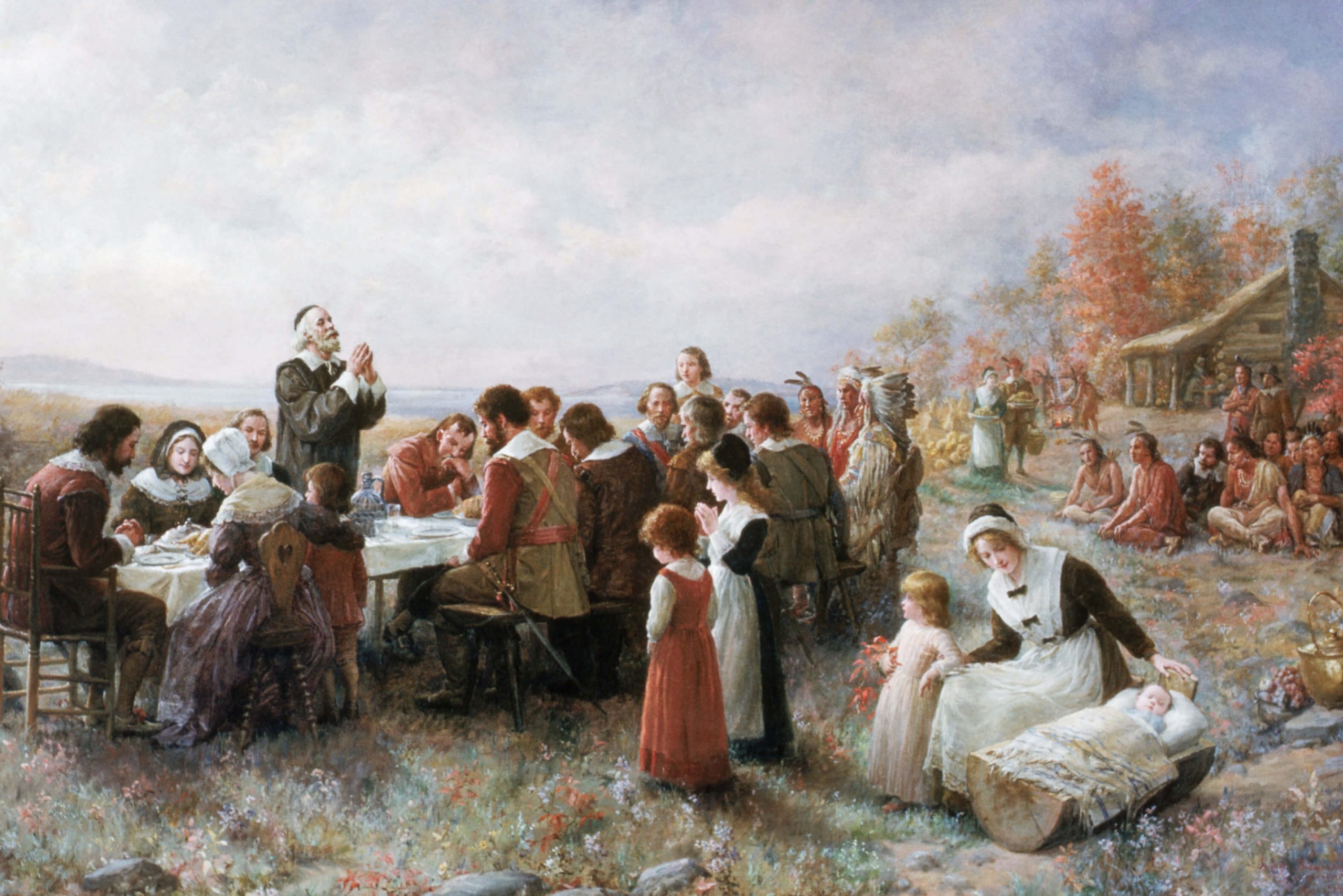
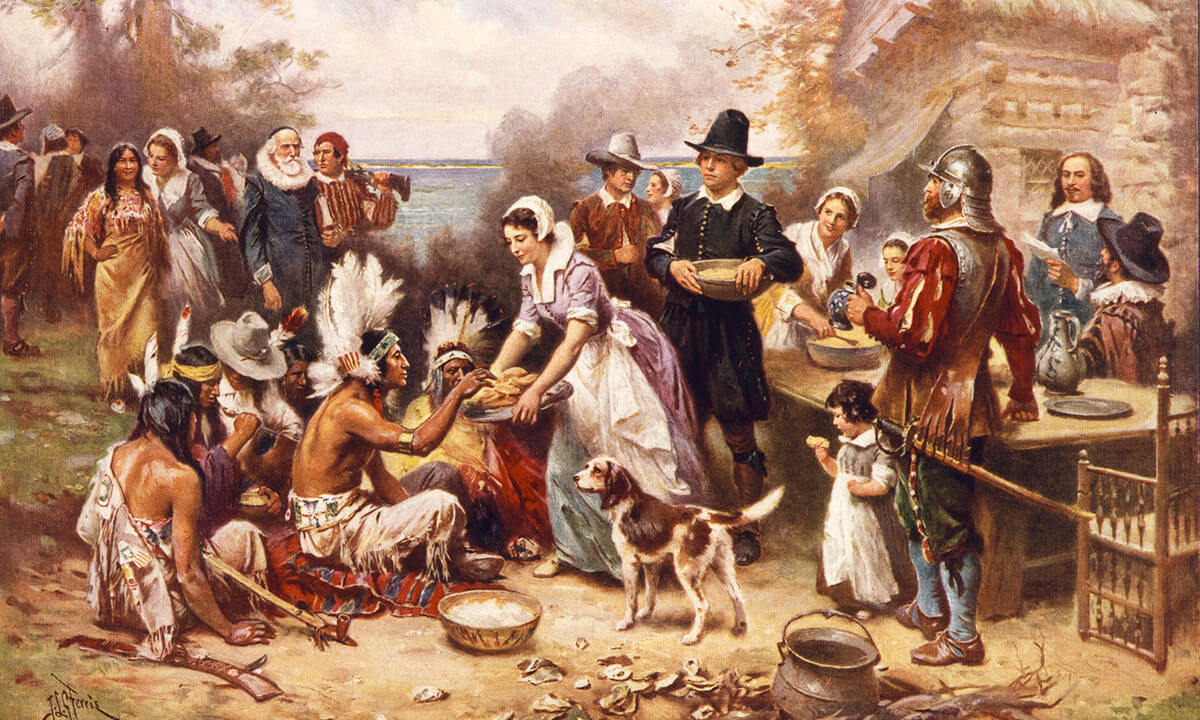
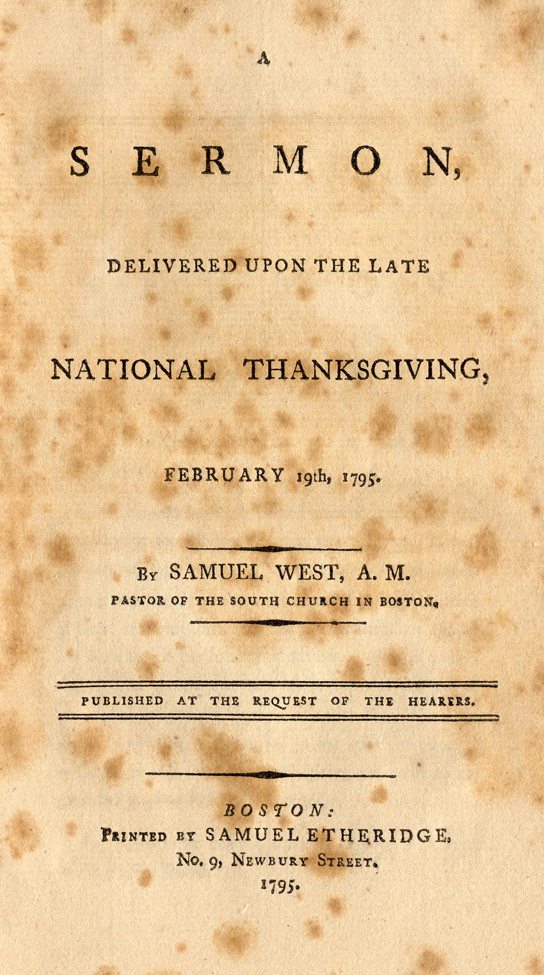
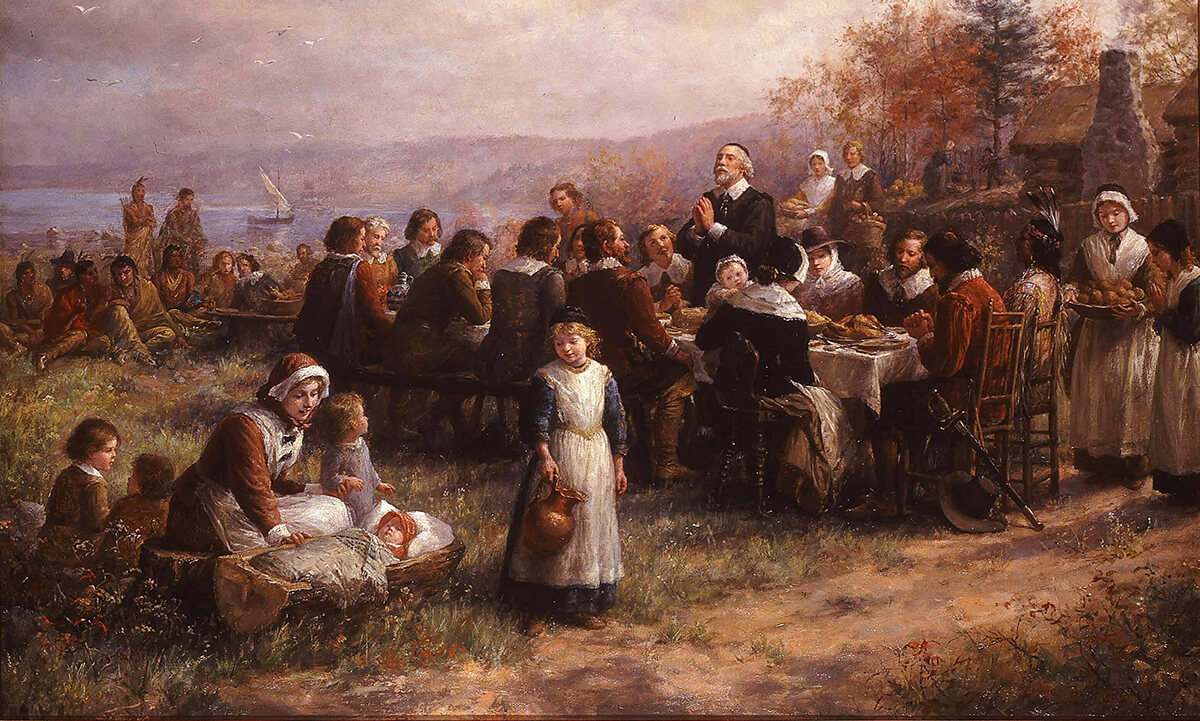
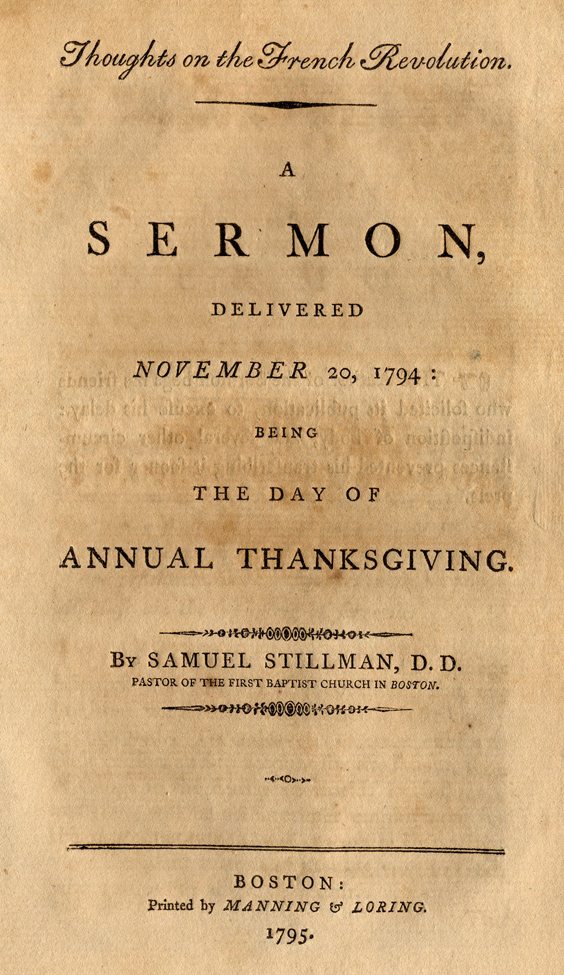

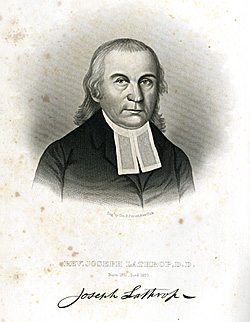 (1731-1820) Biography:
(1731-1820) Biography: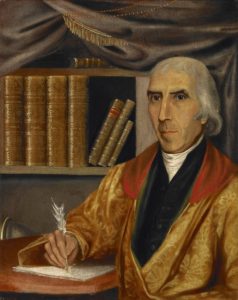 Born in New Haven, Connecticut, Morse graduated from Yale in 1783. He began the study of theology, and in 1786 when he was ordained as a minister, he moved to Midway, Georgia, spending a year there. He then returned to New Haven, filling the pulpit in various churches. In 1789, he took the pastorate of a church in Charlestown, Massachusetts, where he served until 1820. Throughout his life, Morse worked tirelessly to fight Unitarianism in the church and to help keep Christian doctrine orthodox. To this end, he helped organize Andover Theological Seminary as well as the Park Street Church of Boston, and was an editor for the Panopolist (later renamed The Missionary Herald), which was created to defend orthodoxy in New England. In 1795, he was awarded a Doctor of Divinity by the University of Edinburgh. Over the course of his pastoral career, twenty-five of his sermons were printed and received wide distribution.
Born in New Haven, Connecticut, Morse graduated from Yale in 1783. He began the study of theology, and in 1786 when he was ordained as a minister, he moved to Midway, Georgia, spending a year there. He then returned to New Haven, filling the pulpit in various churches. In 1789, he took the pastorate of a church in Charlestown, Massachusetts, where he served until 1820. Throughout his life, Morse worked tirelessly to fight Unitarianism in the church and to help keep Christian doctrine orthodox. To this end, he helped organize Andover Theological Seminary as well as the Park Street Church of Boston, and was an editor for the Panopolist (later renamed The Missionary Herald), which was created to defend orthodoxy in New England. In 1795, he was awarded a Doctor of Divinity by the University of Edinburgh. Over the course of his pastoral career, twenty-five of his sermons were printed and received wide distribution.